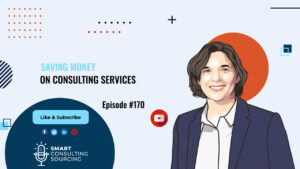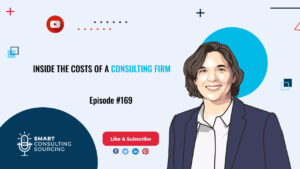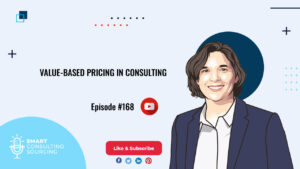If you’re a regular on our Smart Consulting Podcast Series, you already know that we’re on a mission to turn consulting clients into wiser and more informed buyer of consulting services. That is because we have seen a lot of companies to leave money on the table by investing in the wrong projects, overpaying, or failing to capture the full potential of their projects.
But we want to enable every consulting buyer to optimize their consulting ROI. When it comes to optimizing the ROI from your consulting spend, you can use various approaches to achieve that. We use a six levers approach to optimizing the ROI of your consulting spend. And that is a humongous topic, hence, we have decided to dedicate an entire series of podcasts to this topic, explaining in detail how we help our clients to increase the impact they get from consulting and keep their costs under control.
In this inaugural episode of 6 levers to optimize the ROI of your consulting spend, we have shared an overview of the series – what you can expect from it and how it will benefit your organization and more.
Know Your Expenses – The First Step to Optimize the ROI of your Consulting Spend
In today’s world, an overwhelming amount of information is available at our fingertips. It can be tough to sift through everything and scoop out the nuggets of wisdom that we’re looking for.
Often companies monitor only the Consulting Expenses that are centralized by the Indirect Procurement group. They consider that smaller projects are not relevant to the analysis of Consulting Spend.
However, if you are familiar with the notion of tail spend, you know that, when they are unmanaged, small expenses can add up to gigantic amounts.
All the Consulting Expenses, even the small ones, must be integrated.
Not optimizing consulting spend can be an 8-digit problem for your company. And you know of course that since consulting is allocated to OPEX it has a direct impact on your bottom line.
What if you could add 0.5% to EBITDA?
Most companies work well to align their sourcing strategy with the overall goals and targets and optimize their procurement spend and their pool of providers. They even use consultants to accelerate those projects. So why not apply the same logic to the Consulting Category?
Depending on the industry, Consulting can represent up to 3% of revenues. A step change in these costs could very well yield a significant EBITDA improvement.
We’re sure, by now, you understood the reason why we created the 6-levers series. Too many companies try to solve the problem independently and fall flat.
How The 6-Levers Series Happened? Let Us Explain the Context
We launched a survey this summer on the maturity of consulting procurement, and we saw that most companies have a higher maturity on process and category management dimensions than on strategy, governance, organization or enablers. And it tells us that procurement did its best in their own backyard. Still, a transformation requires management support and collaboration, and, in our opinion, this transformation must start at the top, involving the procurement.
Since consulting has huge influence on the strategy, the company valuation, and other matters impacting the entire organization, the procurement as an individual entity has little say on the matter. The decision-makers are the higher-ups here.
However, to make any transformation happen, companies need to include all the stakeholders. And whether you are an impact or savings-driven organization, you need to go through the same hoops. It is the just way you will utilize the value captured through the process that differs.
We designed the 6 levers to optimize consulting spend as a holistic approach, to act on both the technical procurement side, but also manage the change and get the buy-in of the executive committee. We will use them as our guide and will share bite-sized knowledge about them and their significance in each episode.
The 6 Levers for Optimizing Consulting ROI
So, What Are These 6 Levers Made Of?
Suppose your bucket is overflowing. Would you rush to fetch a smaller bucket, or would you tighten the tap? I always say that before you reduce the size of the bucket, you should look at the tap. In other words, consider investing in the right projects. And guess what? This is our first lever – invest in right projects.
Invest in the right projects
Most businesses today use the FIFO principle, or first in, first out. This means that most companies spend their consulting budgets on the first projects they need, regardless of the potential strategic value or ROI. After that budget has been used up, you must either stop or ask for additional money. And nobody wants to postpone highly strategic or profitable projects because you can’t fund them.
But the thing is that sometimes, even a tiny delay can make you lose your competitive edge.
So, when you’re limited on budget, you need to consider what projects will have the highest return for your organization.
This means you have to focus on the most important projects for your organization: the ones that support your strategy directly, those that enable other strategic projects, and those that are very profitable and free up cash to fund more strategic projects.
In a nutshell, you need to shift from a FIFO model to a mix of value-based logic.
Once you have the right projects, you need to figure out how to deliver. And this our second lever: select the right delivery model.
Select the right delivery model
Even before you launch your project, your top objective should be to choose the best delivery approach. The conventional approach is make-or-buy strategy: should I rely on internal resources or outsource to external consultants?
However, this industry is currently experiencing change, creating new opportunities previously unattainable!
So instead of basing your decision only on your resource’s availability, you should adopt a value-based approach, knowing which delivery model would bring in more value from the project. And you approach can integrate the need of confidentiality, the internal vs external dilemma, the need for skill development, … and also explore the different compensation models and see which one is better for this project.
But beyond this individual project, there are some interesting opportunities in the consulting space that look at the big picture. How can we utilize consulting platforms and expert networks? Should we create a group of internal consultants? Or should we consider hybrid project teams?
In other words, you have to develop an overarching policy to select the right delivery model and then design an assessment tool for your teams that they can use for every project.
But, to ensure these processes go smoothly and don’t affect your pockets, controlling your costs would seem a viable way to proceed further. And that is our third lever, controlling your costs!
Buy better: control your costs
Consulting can represent a significant part of your indirect spend. And because it is rarely managed professionally, often decentralized and scattered, it is an incredible source of savings.
And Historical relationships and the complexity of identifying new reliable consulting firms have led to an explosion of consulting costs.
But the “leaks” in consulting procurement can come from several other sources:
- You sometimes buy more than you need because your RFPs are flawed.
- You don’t always involve procurement in your purchase. As a result, you might have a flawed procurement process and no visibility on costs. But worse, because you don’t benefit from their expertise and knowledge of procurement professionals, it is sometimes impossible to anticipate and bend the curve.
- You don’t always work with the right consultants because there’s a lack of knowledge about the consulting market, a lack of diversity and in-depth expertise in the consultants identified and as a result, a list of preferred suppliers that is optimized for your needs.
- You don’t always pay the right price. Many consulting buyers tell me that it is very hard to get some benchmarks on consulting fees. But this is not the only reason for no paying the right price. Many companies work with premium consulting firms for operational projects or have a flawed price negotiation process.
- You sometimes lose control during the project because your internal stakeholders don’t really manage the project, and procurement is not doing its part either.
- And You don’t always count on economies of scale: no framework agreement, no discounts on volume, use of price points too restrictive encouraging workarounds.
But the ROI is not only about costs, right? And those among you that follow me know that I prefer to focus on value and impact. You know, the other part of ROI? Here we go, the fourth lever: secure the impact.
Secure the impact of your projets
You want your projects to deliver impact whether it is advancing your strategy, tracking efficiencies, or capturing savings.
And that means working with the right consulting firm. But what do I mean by right exactly?
- Right technical expertise (capability)
- Right industry experience (when necessary)
- Right political weight (depending on the exposure of your project)
- Right footprint, culture, language
But it’s sometimes difficult to identify the right partner for your project, and consultants claim to be excellent at everything.
So, what are the key elements to secure impact?
- First, a well-written RFP the focus on the must-have. That way you set the expectations and define the ideal consulting firm. You also have to make sure the consultants have the experience and the skills they claim by checking their references.
- Manage your projects to make sure they deliver on the expectations
- Use creative compensation models to align their goals with yours.
Never forget that ultimately, when you buy consulting services, what you are looking for is a not deal, or a fancy approach, it is an impact of your company: be it top line, bottom line, valuation.
And in the same way that you could control the impact, managing and making the most of your suppliers is essential. And that’s our fifth lever, managing the suppliers.
Manage your suppliers
Do you have a ready-made panel of suppliers who you know to be experts in fields you need for your business? Perhaps you do not. Check in with your departments to find out how they access qualified Consulting Services and ensure they have a predictable, responsible source of talent.
In many organizations, consulting is bought directly by the end-users, and procurement arrives at best at the negotiation phase. Procurement is often side-lined on administrative tasks such as contract management, purchase orders, and payments.
However, procurement has a lot to bring to the table: performance measurement, spend management, relationship building, and risk assessments. All these tolls are key success factors in purchasing any goods and services, including consulting.
Your role is to make sure that the suppliers meet or exceed the buyer’s expectation in terms of quality, delivery and cost. But what we observe instead is poor supplier management which results in unreliable suppliers, disruptions, conflicts, unsatisfaction and lack of communication.
When you have all these levers checked, what you need to do is make sure the change sticks. You need to make the change sustainable. And that our sixth lever, Improving your Consulting Sourcing maturity.
Improve your Consulting Sourcing Maturity
We all know that organizations should strive for excellence. But have you ever thought about what it takes to be a mature organization for consulting sourcing?
As mentioned earlier, unless you are already best-in-class, you will have to transform your consulting sourcing. And that means you will need support for your leadership.
Second, people. You need to embark them on the journey, but also train them, build the right organization, and put the right people in the right position. Then processes. How can you change your ways of working without defining new processes: decision-making, sourcing, etc.
And finally, you need to use the right enablers. WE started the show with a recap from our previous episode on the digitalization of procurement. What is digital what an enabler for improving your consulting sourcing maturity?
At the end of the day, a transformation of your Consulting Procurement Capability is no different than any other transformational project. Without embarking on the people, particularly the most senior executives in your organization, the road will be extremely steep or slippery.
You won’t get the full benefits of the transformation if the change is not sustainable. The key ingredients to change are valid.
Create a sense of urgency, involve the stakeholders early in the process, align the executive team on the objectives, communicate efficiently, manage anxiety from the key stakeholders (especially the procurement team), and demonstrate early results.
Closing Thoughts
Here you go. Now you know our 6 levers of optimizing ROI of your consulting spend.
We have created this series with references to real-world problems with insights from real-world problem solvers.
As always, consulting support can be a differentiator for businesses, especially during the worst inflation and recession. Why not use it wisely? This series is aimed at facilitating just that. You’ll emerge as a wise, educated, informed consulting buyer and user at the end of the series.
Here is a glimpse of what we will cover throughout the series:
- Why should companies optimize their consulting spend? What do the companies usually do about their consulting spend?
- Most of the time, the methods or processes they use are inefficient or don’t work, so what can companies do to make it work?
- How to utilize 6 levers to optimize your consulting spend?
- What should you expect? And where to get started?
In the subsequent episodes of this podcast series, you’ll learn all about making an educated choice about procuring consulting and ways to optimizing ROI of your consulting spend. So, don’t skip a single episode to maximize your learning curve. At the end of the series, you will be in a position to buy consulting like a pro.
And if you have any questions about how to optimize ROI of your consulting spend, remember you can always contact me directly on LinkedIn or by email, I’d be more than happy to discuss that further with you.
optimize the roi optimize the roi optimize the roi optimize the roi optimize the roi optimize the roi optimize the roi optimize the roi optimize the roi optimize the roi
optimize the roi optimize the roi optimize the roi optimize the roi optimize the roi optimize the roi optimize the roi optimize the roi optimize the roi optimize the roi
optimize the roi optimize the roi optimize the roi optimize the roi optimize the roi optimize the roi optimize the roi optimize the roi optimize the roi optimize the roi
optimize the roi optimize the roi optimize the roi optimize the roi optimize the roi optimize the roi







